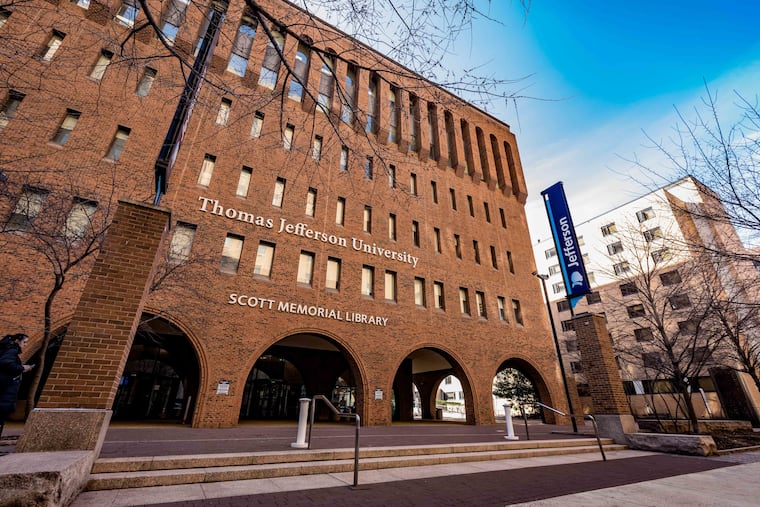Thomas Jefferson University says it will allow on-campus living, in-person classes this fall
The university will give students a choice of returning to campus or taking classses online, and even those who come to campus will face changes: Some large lectures may be held online, and schedules expanded to allow for smaller labs and classes.

Many local universities say it’s too soon to determine whether in-person classes can be held in the fall or students can return to campus and live in the dorms.
Thomas Jefferson University is sending a different message.
“We … plan to resume on-campus classes and operations this fall,” the school announced earlier this week. “In delivering your education in-person, we will operate within a framework that maximizes safety and abides by local, state and federal regulations related to the COVID-19 pandemic.”
The university intends to open the residence halls — with reconfiguring — and resume clinical rotations, said the message from Stephen K. Klasko, president, and Mark L. Tykocinski, provost, both medical doctors.
At the same time, Jefferson is offering students the choice of returning to campus or continuing online learning. For those who choose campus, things will be different: Some large lectures may be delivered online and class schedules will be expanded, allowing for smaller classes, labs, and studios with social distancing, the university said. Students also will have the option of spreading their classes over fall, spring, and summer.
Tykocinski said the university wanted to send a decisive message about fall plans, while allowing for flexibility and acknowledging that factors out of Jefferson’s control, such as governmental direction, could require change.
“We heard loud and clear from many of our students that they really want to get back to campus, that they really value that residential academic experience,” Tykocinski said. “We want to do that, too, but we want to do that safely.”
Jefferson’s decision comes at a critical time; Friday is the deadline for students at some schools to make a deposit if they intend to enroll, though Jefferson has granted extensions to June 1 to students who asked.
Around the country, many colleges have said they will decide on fall plans in May or June. Some say that they are planning for multiple scenarios including a delayed fall semester, online learning, or a hybrid and that a return to campus would depend on things like the availability of testing.
» READ MORE: Colleges holding on-campus classes in the fall? Maybe.
Some have made declarations similar to Jefferson’s. Purdue said it would bring students back in August if government authorities allow it.
Elsewhere in the city, Temple said it will make a decision by the end of May. University of Pennsylvania leaders said they are “planning for a likely combination of in-class and virtual teaching (particularly for large lectures).” Penn has established a group that is looking at “the elements that would need to be in place to allow a safe return to more normal campus operations," but officials there noted, "At this point, it is too early to say exactly when or how that will happen.”
St. Joseph’s University president Mark Reed also said Thursday in a message to the campus that the university intends to start the semester “on ground and on time … barring any restrictions that prevent us from doing so."
In any cases, classes will begin Aug. 24 and faculty could pivot to online in a few days as happened this spring if necessary, he wrote. He outlined four likely scenarios: A return to campus with social distancing and safety measures. A return to campus in August, the elimination of fall break and then a transitioning to virtual classes after Thanksgiving to limit travel. A virtual start to the semester because of government restrictions, then transitioning to on campus. Virtual instruction for the semester.
“We look forward to starting the fall semester and seeing our community back on Hawk Hill soon,” Reed wrote.
Several Jefferson faculty applauded its approach.
“It’s that light at the end of the tunnel we’ve all been searching for,” said engineering Professor Chris Pastore.
Tod Corlett, an industrial-design professor, said prospective and returning students have been asking faculty for weeks if Jefferson had a plan. He was glad to see the statement, knowing how hard it was to do, given the uncertainties of the virus.
“There is some expectation that people need to make some decisions soon about which school to attend, and it’s very difficult … if you’re not seeing a clear statement,” he said.
» READ MORE: Charging full tuition for online classes? No, say some students, despite the coronavirus.
It also helps having a health system with a public health department and its experts, he said. In 2017, Jefferson, with its medical college, hospitals, and health system, acquired East Falls-based Philadelphia University, best known for its design, engineering, and health science programs. Collectively, they enroll about 8,100 undergraduate and graduate students.
Tykocinski said residence halls will include more single units and transportation options for those who take off-campus studios. Dining halls and other facilities also will be reconfigured for social distancing, he said.
Brittney Bell, student body president and a junior from Southampton, is looking forward to the fall.
“Students are eager to get back on campus with proper precautions taken,” she said.